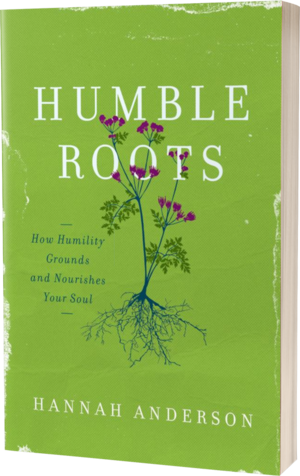I don’t know much about gardening. To be honest, I’ve never had much of an interest in it. So when Hannah Anderson’s book, Humble Roots, showed up for sale on Kindle, I was somewhat hesitant to buy it knowing it was all about gardening. However, I have a hard time passing up good deals on books, especially books as highly acclaimed as this one, so I went out on a limb. And despite my lack of interest in all things plants and gardens I found this book absolutely delightful.

Hannah Anderson masterfully weaves horticultural images and stories from her life in rural Virginia with Scripture to provide lessons on humility and dependence on God. The goal of the book is to “understand how pride manifests itself in anxiety and restlessness; and how humility frees us from the cycle of stress, performance, and competition” (11). Rather than being primarily an awareness of our deficiencies and flaws, Anderson rightly sees humility as awareness of our limitations. Chapters on things such as milkweed, crocus, honey, tomatoes, blackberries, soil, vines, and thorns serve as perfect images and metaphors to teach various aspects of humility and remind us of our own humble roots.
This book was a delight to read, immensely practical, and completely rooted in Scripture—which also happens to be bursting with garden imagery. The metaphors aren’t strained at all and are sure to resonate with all readers to some degree, regardless of your interest in horticulture. At times I even felt a strange and foreign urge to get my own hands dirty!
The following quotes caught my attention as I read Humble Roots: How Humility Grounds and Nourishes Your Soul.
“Humility is accurately understanding ourselves and our place in the world. Humility is knowing where we came from and who our people are. Humility is understanding that without God we are nothing. Without His care, without His provision, without His love, we would still be dust.” (56)
“If we are to find rest from our stress, if we are to have any hope of escaping our pride, we must be grafted onto the one who is humility Himself. We can no longer simply be content to imitate Him; we must become part of Him in order to reflect Him. And this begins by remembering the truth about who we are and where we come from…we must learn our roots. And we learn this by encountering Jesus himself. Through His humanity, we learn what ours is supposed to be. Through His deity, He enables us to be what we are supposed to be. And when we are, when we exist as God has intended us to exist, we will find rest.” (56-57)
“The core issue, and the theme of this book, is this: We are not Jesus. Jesus comes to restore our humanity through His, but we are not Jesus. We can be entirely well-intentioned, but if we attempt to pursue even humility apart from Him, we will simply act out of our own pride once again.” (75)
“When we are consumed with God’s glory, we forget to worry about our own. When our eyes are fixed on Him as the source of all goodness and truth and beauty, we accept that we are not. When we are enamored by His worth and majesty, we can stop being so enamored with ourselves. And fascinatingly, when we seek God’s glory, we’ll be able to appreciate it in the people around us. Instead of seeing them as threats to our own glory, we will see them as beautiful reflections of His.” (75)
“Wisdom is not the result of formal education or religious practice; wisdom is the result of humility. When we remember who we are and who God is, we will also remember where knowledge comes from and we will seek His help to assimilate the facts we’ve accumulated.” (119)
“We must learn to view spiritual formation as the process of ripening on the vine, not simply the process of turning red. One reason so many people who’ve grown up in the church seem so immature—so green—is because their faith has not been given space and time to mature naturally. When we are fixated on the goal of ‘red’ tomatoes, we are tempted to prioritize hearing certain phrases or seeing certain religious practice.” (130)
“Gratitude born from humility is not a gratitude rooted in having more than someone else. It is a gratitude rooted in having anything at all. Instead of comparing what you have with other people (either more or less), humility teaches you to compare what you have now with what you had when you entered this world.” (142)
“At the same time humility leads us to embrace desire, it also teaches us how powerless we are to make our desires come to fruition. We can plan. We can build a trellis. We can plant beans. We can do all the right things. But we are not guaranteed a harvest simply because we worked hard and planned well.” (164)
“Humility teaches us that God is actively redeeming the world. And because He is, we can experience the relief of confessing our brokenness—whether it is intentional sin, our natural limitations, or simply the weight of living under the curse. Humility teaches us to find rest in confession. Rest from the need to hide, the need to be perfect. We rest by saying, both to God and others, ‘I am not enough. I need help.’ And ultimately, the humility that leads us to confess our brokenness, both within and without, also frees us to grieve it and throw ourselves on the mercy of God. And this, more than anything, leads to rest.” (186)
“Blackberries with their prickly canes and lush fruit embody God’s grace in the midst of our suffering. Even in the brokenness, there is life. Even in the brokenness, there is goodness. Even in the brokenness, there is hope.” (188)
“Jesus’ work to restore humility did not end with His own resurrection. Even today, even now, His work of resurrection continues. Even now, He is cultivating His garden. Even now, the second Adam, the true Son of Man, is tending His Eden. And as we submit to His skillful hand, our own hearts and lives—though perhaps for a time locked and dead—will break forth in green.” (201)




